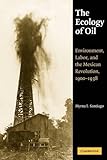The ecology of oil environment, labor, and the mexican revolution, 1900-1938 Myrna I. Santiago
Tipo de material: Libro
impreso(a)
Idioma: Inglés Series Detalles de publicación: New York, New York, United States Cambridge University Press 2006Descripción: xiv, 411 páginas ilustraciones 23 centímetrosISBN:
Libro
impreso(a)
Idioma: Inglés Series Detalles de publicación: New York, New York, United States Cambridge University Press 2006Descripción: xiv, 411 páginas ilustraciones 23 centímetrosISBN: - 9780521115377
- 338.27282 S2
Bibliografía: páginas 373-396 e índice
An exploration of the social and environmental consequences of oil extraction in the tropical rainforest. Using northern Veracruz as a case study, the author argues that oil production generated major historical and environmental transformations in land tenure systems and uses, and social organisation. Such changes, furthermore, entailed effects, including the marginalisation of indigenes, environmental destruction, and tense labour relations. In the context of the Mexican Revolution (1910-1920), however, the results of oil development did not go unchallenged. Mexican oil workers responded to their experience by forging a politicised culture and a radical left militancy that turned 'oil country' into one of the most significant sites of class conflict in revolutionary Mexico. Ultimately, the book argues, Mexican oil workers deserve their share of credit for the 1938 decree nationalising the foreign oil industry - heretofore reserved for President Lazaro Cardenas - and thus changing the course of Mexican history. Inglés


